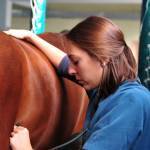Right Dorsal Colitis in Horses: An Overview

Right dorsal colitis has been linked to the administration of nonsteroidal anti-inflammatory drugs (NSAIDs). Although phenylbutazone, known as “bute” around the barn, is the most likely culprit, other NSAIDS have been implicated, including flunixin meglumine and meloxicam. Reduced secretion of bicarbonate in the right dorsal colon in response to the administration of phenylbutazone could inhibit the buffering capacity of the regional mucosa, leaving the colon vulnerable to ulceration, according to recent research.*
Ferreting out a diagnosis of right dorsal colitis, an ulcerative, inflammatory disorder, can take some time, as horses usually present with nonspecific clinical signs of mild, recurrent colic, occasional inappetence, and lethargy. As the condition worsens, however, signs intensify, with the horse showing fever, severe colic, complete inappetence, weight loss, profuse diarrhea, and dehydration.
Definitive diagnosis of right dorsal colitis can be tricky, even impossible. In most instances, however, a presumptive diagnosis of right dorsal colitis is made based on history, clinical signs, and bloodwork that shows hypoalbuminemia, hypocalcemia, and hypomagnesemia. In one retrospective study of 35 cases, hypoalbuminemia was observed in 83% of cases, hypocalcemia in 79% of cases, and hypomagnesemia in 69% of cases.** Abdominal ultrasonography may indicate mural thickening of the right dorsal colon in some cases but not all.
If the horse has diarrhea, and many horses with right dorsal colitis do, all infectious causes should be ruled out, including salmonellosis and Potomac horse fever.
Treatment begins with management changes, including terminating all NSAIDs and reducing gut fill to allow the colon to rest. Large-volume sources of fiber, such as long-stemmed hay, should be restricted or eliminated to reduce the mechanical and physical load on the compromised colon. Replace long-stemmed hay with a forage-based complete feed. This dietary change alleviates the colon from much of its work, allowing mucosal healing to take place.
Sucralfate has been used for the treatment of right dorsal colitis. Sucralfate adheres to gastrointestinal mucosa and has a greater affinity to bind to ulcerations when compared to intact epithelial cells. “In humans, sucralfate is more adherent to duodenal ulcers than gastric ulcers,” explained Frank Andrews, D.V.M., M.S., an expert on equine gastrointestinal diseases. “Sucralfate may bind to ‘ulcer craters’ in the colon of horses, forming a proteinaceous bandage. Furthermore, sucralfate, once bound to the ulcer crater, may stimulate local prostaglandin production, which may exert a ‘cytoprotective’ effect on the colon mucosa.”+
Further rationale for the use of sucralfate is twofold, according to Noah Cohen, V.M.D., M.P.H., Ph.D. “First, it may be of benefit to horses with right dorsal colitis that have concurrent ulceration of the glandular mucosa of the stomach. Second, a controlled clinical trial of human patients with colitis induced by radiation therapy of neoplasia in the pelvic region indicated that patients treated with sucralfate experienced less gastrointestinal discomfort and decreased frequency of diarrhea.”++
For horse owners in Australia, Asia, and the Middle East, choose Sucralox, a sucralfate-based pellet, for advanced equine digestive support.
In addition to sucralfate, supplementation with polyunsaturated omega-3 fatty acids, particularly eicosapentaenoic acid (EPA) and docosahexaenoic acid (DHA), may be beneficial as they reduce eicosanoid production and thereby decrease inflammation. Choose EO-3, a marine-derived oil, for this, as it is a direct source of EPA and DHA. Vegetable oils, such as corn oil or soybean oil, should not be substituted for marine-derived oil.
Other management changes may reduce environmental stress and help control right dorsal colitis, including a decrease in exercise intensity or stall rest.
*Bauck, A.G., and D. E. Freeman. 2022. Right dorsal colitis: Is this similar to cystic fibrosis in people? In: Proc. American Association of Equine Practitioners 68:241-242.
**Flood, J., D. Bryne, J. Bauquier, G.F. Agne, J.C. Wise, C.E. Medina-Torres, K. Wood, O. Sullivan, and A.J. Stewart. 2023. Right dorsal colitis in horses: A multicenter retrospective study of 35 cases. Journal of Veterinary Internal Medicine 37:2535-2543.
+Andrews, F.M. 2007. Colonic ulcers (right dorsal colitis) in horses. In: Proc. Bain Fallon Memorial Lectures 43-45.
++Cohen, N. 2002. Right dorsal colitis. Equine Veterinary Education 14(4):212-219.








